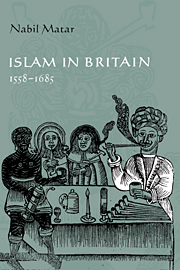Book contents
- Frontmatter
- Contents
- Acknowledgments
- Transcription
- Introduction: Islam in early modern Britain
- 1 “Turning Turke”: conversion to Islam in English writings
- 2 The renegade on stage and in church
- 3 “Arabia Britannica”: “Alcoran” and the legacy of Arabic Islam
- 4 “Baptizing the Turk”: conversion to Christianity in English writings
- 5 Eschatology and the Saracens
- Conclusion: Islam and Britain: centripetal to centrifugal
- Bibliography
- Index
2 - The renegade on stage and in church
Published online by Cambridge University Press: 27 October 2009
- Frontmatter
- Contents
- Acknowledgments
- Transcription
- Introduction: Islam in early modern Britain
- 1 “Turning Turke”: conversion to Islam in English writings
- 2 The renegade on stage and in church
- 3 “Arabia Britannica”: “Alcoran” and the legacy of Arabic Islam
- 4 “Baptizing the Turk”: conversion to Christianity in English writings
- 5 Eschatology and the Saracens
- Conclusion: Islam and Britain: centripetal to centrifugal
- Bibliography
- Index
Summary
The power of the “Turks” was brought home to English society by the descriptions of, and numerous references to, the “renegade.” Although travelers, captives and chroniclers always made a point of denigrating the convert for renouncing his religion and country, they confirmed that renegades lived in prosperity and wealth: indeed, the over-all portrait of the renegade in their writings is of one who had met with success. There are very few renegades who appear in travelogues, chronicles or state papers who are destroyed by guilt or by the heinousness of their apostasy; neither are there allusions to renegades who never succeeded among the Muslims – who never attained the social or economic security that may have motivated their conversion. While the travelers and captives did not (and indeed would not) praise the converts, they could not but accurately state that converts did rise to positions which they might not have attained in Christendom.
Travelers who wrote accounts of their journeys, along with the numerous seamen who orally described the renegades (and spun tales about them) informed the public, for instance, that in Tunis and Tripoli (in the late sixteenth and early seventeenth centuries), the highest offices were exclusively available to Christian converts to Islam and to other non-Moors. No wonder that the English renegade pirates Samson and Edward became legendary for their luxurious lives in Algiers, and numerous songs celebrated the pirate and renegade John Ward well into the Caroline and the Restoration periods.
- Type
- Chapter
- Information
- Islam in Britain, 1558–1685 , pp. 50 - 72Publisher: Cambridge University PressPrint publication year: 1998
- 1
- Cited by



